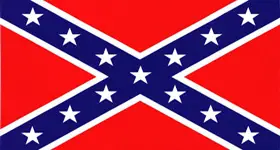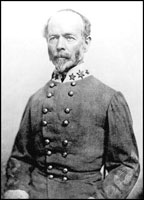Civil War Battles |
Colonial Wars |
American Wars |
Link To This Page — Contact Us —
The Surrender of Gen. Joseph Johnston
April 26, 1865 in Durham, North Carolina
  |
Following its strategic defeat at Bentonville, N.C., March 21, the army of Gen. Joseph E. Johnston was reduced to perhaps 30,000 effectives, less than half the size of Maj. Gen. William T. Sherman's Union command. Though the Confederates had fought well at Bentonville, their leader had no illusions about stopping his adversary's inexorable march through North Carolina. When Maj. Gen. John M. Schofield's force, joining Sherman at Goldsborough March 24, swelled the Union ranks to 80,000, Johnston saw the end approaching.
Dutifully, however, he followed Sherman's resumed march northward April 10. En route the Confederate commander learned of the evacuation of Petersburg and Richmond and of Gen. Robert E. Lee's surrender at Appomattox. This ended his long-held hope of joining Lee to oppose the invaders of the Carolinas.
Arriving near Raleigh, Johnston at first attempted to have North Carolina Gov. Zebulon B. Vance broach surrender terms to Sherman. On the 12th, Johnston went to Greensborough to meet with fugitive Confederate Pres. Jefferson Davis, whom he persuaded to authorize a peace initiative. Sherman was immediately receptive to peace negotiations.
On the 17th, under a flag of truce near Durham Station, Maj. Gen. William T. Sherman met with Gen. Johnston to discuss surrender terms and showed him a dispatch announcing Pres. Lincoln's assassination. The 2-day conference at the James Bennett home produced peace terms acceptable to both generals, but Sherman reckoned without Secretary Stanton, who had assumed near-dictatorial powers, and who wanted harsh terms for the defeated South. Officials in Washington quickly rejected the agreement and criticized Sherman's imprudence.
Disappointed, the Sherman informed Johnston that unless more widely acceptable terms were reached, a 4-day armistice would end on the 26th. That day, however, the war-weary commanders met again at the Bennett home and thrashed out an agreement confined to military matters. Grant, who had been sent to Raleigh, signed his approval of the revised agreement, and on May 3rd, Johnston's once-proud army laid down its arms, closing hostilities east of the Mississippi River.
